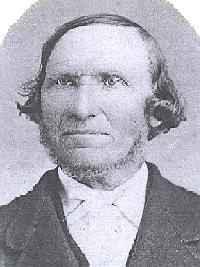

Born: November 22, 1818, Kelso, Scotland
Died: June 10, 1889, Vancouver, Washington Territory
Born in Scotland on the River Tweed, Peter W. Crawford was just 29 years old when he crossed the plains to Oregon Territory and in 1847 platted the town of Oregon City. A civil engineer and surveyor, Peter was educated at the University of Edinburgh and completed his studies in London and Southampton.
In 1843 Peter booked passage on the ŚRainbową, proceeding through Canada to Michigan where he joined his older brother, Alexander. After a short time, he left for Chicago and later took a teaching position in Indiana. Then on April 12, 1847 he departed Valparaiso with the Cline family and headed west. Peter kept a journal in which he recorded the many trials that pioneers faced along the journey and descriptions of the trail: ŚCountry looks wild...leaving all civilized life all, all, Behind...".
The party arrived at the Columbia River six months later. Peter described the scene: "A great many Estimated one thousand wagons on the way in 1847 and four persons to the wagon - and that three hundred forty six came down the columbia River on Rafts and Boats great and small...the Reader of this narrative will have Some Idea of the vast confusion and comingled Bustle around those places of natural obstructions to a free passage of Such a concorse-a cavalcade of worn out men women and children of all ages from the meere Infant baby to the adult child...".
That winter, upon the recommendation of Rev. Marcus Whitman, Peter located a 240 claim on the Cowlitz River in northern Oregon. He traveled around the territory with an ox team surveying communities and laying out towns. After platting the town of Oregon City, the next year Peter surveyed the town site of Vancouver. He also surveyed all donation land claims on Sauvie Island and worked for the U.S. Land Office. His other pursuits included a business venture with a London baker who sold sea biscuits to miners.
Peter tried his luck in the California gold fields, but returned shortly after to work his land claim on the Cowlitz. There he planted 100 apple trees. Unfortunately, his first house was destroyed by fire and the site of his second home was later chosen as the center route for the Northern Pacific Railroad.
Peter participated in the Monticello Convention in 1852, petitioning for the separation of Oregon. Over the years, he held several political posts including Justice of the Peace and surveyor for the City of Vancouver and Clark and Cowlitz counties.
In 1854, Peter married eighteen year old Zillah Patterson, daughter of Clark County pioneers Ira and Martha Patterson. Three sons and two daughters were born of that union.
Thirty years later, Peter founded the City of Kelso. Later his Kelso home was donated to the city for a school. The first class school, consisting of twenty pupils, was held in the kitchen.
Peter died in 1889, his wife preceding him by one year. They are buried in Old City Cemetery, Vancouver, Washington.
Junel Davidsen wrote this article from information published in "Clark County Pioneers ~ Through the Turn of the Century",, 1993, by Rose Marie Harshman and wording provided by Karen Lawrence from "The Overland Journey to Oregon In 1847, by PW Crawford, One Emigrant Tells His Story In His Words", 1997, Charles George Davis, Publication Editor.
Compiled and contributed by Junel Davidsen on 5 May 2003.